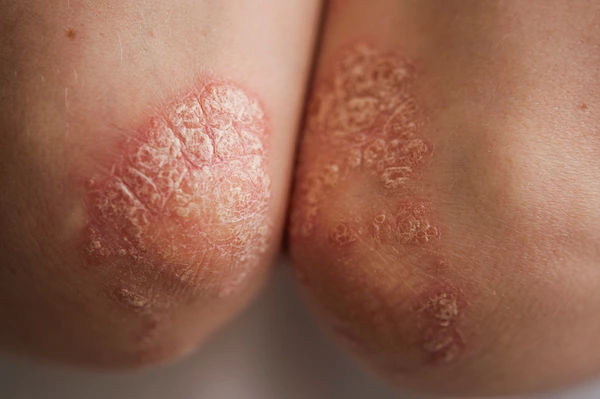Psoriasis Causes: All You Need To Know
Psoriasis is a chronic, autoimmune disease that affects the skin, causing rapid skin cell turnover, leading to the characteristic red, scaly patches. While the exact cause of psoriasis remains elusive, it is clear that multiple factors—genetic, immune, and environmental—interact in a complex way to trigger the disease.

Written by Dr Sonia Bhatt
Last updated on 3rd Jul, 2025
Psoriasis is a multifaceted disease that results from a complex interplay of genetic, immune, and environmental factors. Although its exact cause is not fully understood, it is clear that the immune system’s overactivity, combined with genetic predisposition and environmental triggers, leads to the rapid skin cell turnover that affects the disease. Understanding these underlying psoriasis causes is essential for patients and healthcare providers alike, as it can help guide treatment approaches and improve outcomes. In this article, we will explore the key factors that contribute to the development and exacerbation of psoriasis, providing an in-depth look at Psoriasis Causes.
Genetic Predisposition of Psoriasis
One of the most significant contributing factors to the development of psoriasis is genetics. Research indicates that psoriasis has a strong hereditary component, and individuals with a family history of the disease are at an increased risk of developing it. It is estimated that about 30% of people with psoriasis have a first-degree relative (parent or sibling) who also suffers from the condition.
Psoriasis is associated with several genetic markers, primarily those that influence the immune system. The two most important gene regions linked to psoriasis are HLA-Cw6 and IL-23R, both of which play roles in immune regulation and inflammatory processes.
HLA-Cw6 is part of the human leukocyte antigen (HLA) gene complex, which is responsible for controlling immune responses. Variations in this gene increase the likelihood of developing psoriasis by making the immune system more prone to attacking healthy skin cells.
The IL-23R gene is involved in the production of interleukin-23, a cytokine that plays a central role in the immune system’s inflammatory response. An overactive immune response triggered by this gene leads to the rapid turnover of skin cells seen in psoriasis.
While genetics certainly plays a role in susceptibility to psoriasis, it is not the sole determining factor. Many people who carry these genetic markers never develop psoriasis, suggesting that other factors, like environmental triggers, are essential in the onset and severity of the disease.
Immune System Dysfunction and Psoriasis
Normally, the immune system defends the body against infections and harmful invaders. However, in the case of psoriasis, the immune system becomes hyperactive, leading to the production of excessive T cells and inflammatory molecules. This abnormal immune response involves several key components:
1. T Cells and Cytokines
T Cells Activation: In psoriasis, T cells (a type of white blood cell) become overactive. Rather than fighting infections, they migrate to the skin, where they trigger an inflammatory response. This results in the overproduction of skin cells, which are pushed to the surface before they have matured. The rapid buildup of these cells leads to the characteristic patches of red, inflamed, and scaly skin seen in psoriasis.
Cytokine Release: Activated T cells release several cytokines (inflammatory cells) such as tumour necrosis factor-alpha (TNF-α), interleukin-17 (IL-17), and interleukin-22 (IL-22). These proteins contribute to inflammation and skin cell turnover, amplifying the symptoms of psoriasis.
2. Inflammatory Cascade
Keratinocyte Proliferation: The cytokines lead to an increased production of keratinocytes, the primary type of cell found in the epidermis. Normally, skin cells take about 28 to 30 days to mature and shed, but in psoriasis, this process accelerates to 3 to 4 days.
Plaque Formation: The rapid turnover of skin cells results in the accumulation of immature keratinocytes on the skin surface, forming thick, scaly plaques that are characteristic of psoriasis.
The immune dysfunction in psoriasis not only affects the skin but can also lead to other conditions, such as psoriatic arthritis, where the immune system attacks the joints, causing pain, stiffness, and swelling.
Environmental Triggers: What Can Set Off Psoriasis Flare-Ups?
While genetic factors and immune dysfunction are central to the development of psoriasis, environmental triggers can play a crucial role in the onset and exacerbation of the condition. These triggers vary from person to person, but they can significantly impact the frequency and severity of psoriasis flare-ups.
Common environmental triggers include:
1. Stress
Stress is one of the most commonly reported triggers for psoriasis flare-ups. Emotional and psychological stress can trigger a cascade of inflammatory responses in the body, leading to an increase in psoriasis symptoms. Stress can also weaken the immune system, making it more prone to overactive responses that lead to skin irritation.
2. Infections
Infections, particularly strep throat, can trigger psoriasis flare-ups, especially in children. This form of psoriasis is known as guttate psoriasis, which is marked by small, drop-like lesions across the body. Other infections, such as respiratory infections, can also worsen symptoms in individuals who are genetically predisposed to the disease.
3. Skin Injuries (Koebner Phenomenon)
Physical trauma to the skin, such as cuts, scrapes, sunburns, or even insect bites, can trigger the development of psoriasis lesions at the site of injury. This phenomenon is known as the Koebner response, where new psoriasis patches appear on skin that has been injured or traumatized.
4. Medications
Certain medications can worsen psoriasis or trigger new flare-ups. Medications that have been linked to psoriasis exacerbation include beta-blockers (used to treat high blood pressure), lithium (used for bipolar disorder), and certain antimalarial drugs. It's important to consult a doctor if you suspect that a medication is worsening your psoriasis.
5. Climate and Weather
Environmental factors such as cold, dry weather can cause the skin to dry out, leading to flare-ups in individuals with psoriasis. Conversely, hot and humid weather may also trigger psoriasis in some people. It’s important for those with psoriasis to maintain adequate skin moisture, especially during cold months when the air is dry.
6. Dietary Factors
A link exists between diet and psoriasis, as certain foods can trigger flare-ups. Alcohol, spicy foods, and high-sugar foods are commonly identified as triggers. On the other hand, an anti-inflammatory diet rich in omega-3 fatty acids, fruits, vegetables, and whole grains may help reduce inflammation and improve overall skin health.
Other Contributing Factors: Hormones, Obesity, and Lifestyle
In addition to genetics, immune dysfunction, and environmental factors, several other factors can contribute to the onset and worsening of psoriasis:
1. Hormonal Changes
Hormonal fluctuations, such as those occurring during puberty, pregnancy, and menopause, can influence the development and severity of psoriasis. Some women experience an improvement in psoriasis during pregnancy, while others may see flare-ups due to hormonal changes.
2. Obesity
Being overweight is a known risk factor for psoriasis. Excess fat tissue releases inflammatory cytokines, which can exacerbate psoriasis symptoms. Additionally, the folds of skin in obese individuals can create friction and irritation, making psoriasis more difficult to manage. Maintaining a healthy weight may improve the condition.
3. Smoking and Alcohol Consumption
Smoking has been shown to increase the risk of developing psoriasis and can worsen symptoms in those already diagnosed. Smoking interferes with the skin’s healing process and can make psoriasis treatments less effective. Similarly, excessive alcohol consumption can exacerbate psoriasis and interfere with treatment.
Conclusion
Identifying personal triggers, seeking appropriate treatments, and making lifestyle changes can significantly improve quality of life and reduce psoriasis flare-ups. If you are struggling with psoriasis, working closely with a healthcare provider can help you find an effective management plan tailored to your needs.
Consult Top Dermatologist
Consult Top Dermatologist
Dr. Kavitha Killaparthy
Dermatologist
23 Years • MBBS,DIPLOMA(DERMATOLOGY,VENEREOLOGY,LEPROSY)
Hyderabad
JDS Skin & Hair Clinic, Hyderabad
Dr. Mayuri Jain
Dermatologist
11 Years • MBBS, MD Dermatology , Venereology & Leprosy
Delhi
Dr Mayuri Jain Clinic, Delhi

Dr Ekansh Shekhar
Dermatologist
10 Years • MBBS MD
Lucknow
Apollo Clinic Hazratganj, Lucknow
Dr.j Girishma
Dermatologist
6 Years • MBBS MD DERMATOLOGY
Bengaluru
Apollo Medical Center, Marathahalli, Bengaluru

Dr. Satarupa Mondal
Dermatologist
7 Years • MBBS , MD (Dermatology , Venereology & leprosy) , Diplomate (Derm.Vene.Lep)
Kolkata
Dr Satarupa Mondal, Kolkata

